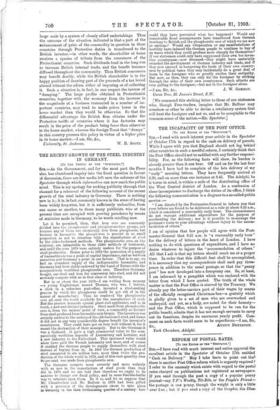THE RECENT GROWTH OF THE STEEL INDUSTRY IN GERMANY.
[TO THE EDITOR OF THE "SPECTATOR."]
S111,—As the Government, and for the most part the Press also, has abandoned inquiry into the fiscal question in favour of discussion, there are few media left save the columns of the Spectator through which information can now reach the public mind. This is my apology for seeking publicity through that channel for a rehearsal of the following account of the recent growth of the steel industry in Germany. There is nothing new in it; it is, in fact, commonly known in the sense of having been widely forgotten, but it is sufficiently unfamiliar, from one cause or another, to those many publicists who at the present time are occupied with proving paradoxes by means of statistics made in Germany, to be worth retelling now.
Let it be premised, then, that iron ores are commonly divided into the phosphoretic and phosphorous-free groups, not because any of them are chemically free from phosphorus, but because in haematite the phosphorus is present in so small proportion as not to interfere with the manufacture of steel by the-older-fashioned methods. The phosphoretic ores, on the contrary, are intractable to these older methods of treatment, and until the year 1878 were entirely useless for the purpose of steel production. Hence prior to 1878 the possession of a supply of haematite ore was a point of capital importance, and as between ourselves and Germany a point in our favour. That is to say, we had . an abundant supply of the indispensable haematite, and Germany had been richly endowed by the hand of Nature with the comparatively worthless phosphoretic ores. Therefore Germany bought our steel and iron for conversion into steel, and did not seriously compete with us in that class of industry.
But in or about the year 1878—I am writing from memory —a young Englishman named Thomas, who was, I believe, a clerk • in a suburban post-office, invented a steel-making process by which the phosphorus could be got rid of in the course of manufacture. Thus he rendered the phosphoretic ores all over the world available for the manufacture of steel. But the process demands special plant and appliances, and is, in truth, a. new and distinct industry. Steel made from phosphoretic ores is, from the makers' point of view, a commodity as distinct from steel produced from haematite as is bronze. The invention was entirely useless to the makers of the old-fashioned steel, and hence it did not in any very considerable degree benefit the inventor's countrymen. They could have got on very well without it, for it meant the destruction of their monopoly. Bat to the Germans it was a Godsend. It have a high commercial value to the com- paratively worthless deposits of Luxemburg and Lorraine, and a new industry to the Fatherland. This increased value would alone have paid the French indemnity and more, and of course it enabled the German people to supply themselves with steel instead of buying from us. In 1901 the German production of steel amounted to six million tons, more than twice the pro- duction of the whole world in 1878, and of this vast quantity over 90 per cent. was made from phosphoretic ores.
The Germans compete more severely and more unfairly with us now in the manufacture of steel goods than they did in 1878, and we are told that therefore we ought to be anxious to change our fiscal policy, and in some forcible-feeble way to retaliate upon them. Be it so, and let us suppose that Mr. Chamberlain and Mr. Balfour in 1878 had been gifted with a prevision of the developments about to take place in Germany in the then forthcoming quarter of a century c how could they have prevented what has happened? Would any conceivable fiscal arrangements have transferred from German territory to British soil the phosphoretic ores of which we are now so envious ? Would any vituperation or any manifestations of hostility have induced the German people to continue to buy of us wares which they could produce more cheaply for themselves? If our statesmen could only have suppressed their own too inven- tive countryman—now deceased—they might have materially retarded the development of German industry and trade, and if they now succeed in hampering the trade of their own country- men by political taxes they may incidentally do a great deal of harm to the foreigner who so greatly excites their antipathy. But now, as then, they can only hit the foreigner by striking through the sides of their own countrymen. Such attacks are very galling to the foreigner,—but not to the foreigner alone.
Cocoa Tree, St. James's Street, S. W.
[We commend this striking letter to those of our statesmen who, though Free-traders, imagine that Mr. Balfour may somehow or other be able to devise a retaliatory system that will hurt the foreigner and not us, and so be acceptable to the common-sense of the nation.—ED. Spectator.]


















































 Previous page
Previous page